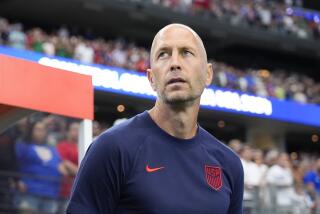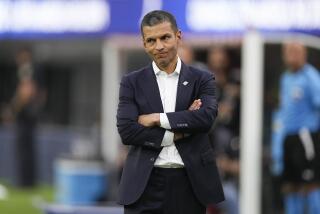Brazil No Longer So Beautiful
- Share via
YOKOHAMA, Japan — So Brazil has qualified again for the World Cup, extending its unequaled streak of perfect attendance to 17 tournaments.
Says who?
The yellow jerseys look familiar. The players still come equipped with optional surnames. But if Brazilian soccer once meant something to the rest of the world--peerless finesse and technique, a style as easy on the eyes as it is tough to defend--this cannot possibly be Brazil.
A Brazil that lost six times in 18 qualification games and finished tied for third with Paraguay, one point behind Ecuador?
A Brazil that went through three coaches in 10 months and more than 60 players before qualifying on the very last day?
A Brazil that abandoned its famed jogo bonito--the beautiful game--in favor of a cynical, foul-and-stall defensive approach local media have derisively nicknamed futbol brucutu--bullyboy football?
The homeland of Pele and Garrincha today harbors the most brutish domestic league in the world, racking up an average of more than 60 fouls a game. The national team, once revered for its artistry and innovation, is now captained by a defensive midfielder named Emerson Ferreira, a red card waiting to happen who specializes in hard fouls and crunching tackles.
Luiz Felipe Scolari, the current coach, often plays with five defenders behind a pair of holding midfielders, encouraging his players to “kill the play”--foul someone to stop the action--and waste time whenever possible.
This is Brazil?
Not to such aghast alumni as Zico, who watched the team lose to the likes of Bolivia, Ecuador and Chile during qualifying and complained, “Even worse than playing badly is seeing the team play without creativity and daring, which have always been the strong point of Brazilian football.”
Nothing really has been the same since Brazil meekly surrendered the World Cup to France in the 1998 final, 3-0. That day, Ronaldo, the 21-year-old curator of the Pele legacy, morphed from myth to missing in action, seeming to sleep-walk through the match after suffering from (depending on which report you read) an anxiety attack or an epileptic seizure or a nervous breakdown or a severe case of rookie big-game jitters.
From that day forward, Brazilian soccer has steadily backslid, a slump that coincided with Ronaldo’s literal disappearance from the field for nearly three years because of knee injuries.
In 2000, Brazil was eliminated by Cameroon at the Olympics, which cost coach Wanderley Luxemburgo his job. Luxemburgo’s replacement, Emerson Leao, lasted only nine months. Leao oversaw a Brazilian team that lost to Australia, 1-0, and played Japan and Canada to scoreless draws in the 2001 Confederations Cup--and learned he had been fired at the airport before boarding the flight home.
On came Scolari, Brazil’s eighth coach since 1990, who quickly sized up the situation: “If I don’t win, I’m dead meat.”
“Big Phil,” as the Brazilian media refer to him, adopted a style of soccer as blunt as his philosophy in career advancement. He bulked up on defense-minded players and instructed them to just get the result, to do whatever it takes.
Ironically, the approach yielded some of the most embarrassing defeats Brazil had ever seen. Brazil opened the 2001 Copa America with a 1-0 loss to Mexico, the team’s fourth defeat in a row--Brazil’s longest losing streak since 1921. A few days later, Scolari’s team was eliminated from the tournament by Honduras.
“Write it down in your notebook, in the book of records,” Scolari said at the time. “I will be the coach who lost to Honduras. If it’s humiliating, shameful or ugly, put whatever adjectives you want. But we’re all hurting.”
Scolari eventually squeezed out a World Cup berth, concluding a 9-6-3 campaign Pele dismissed as “terrible.” But he did not help himself when he announced his 23-man roster and did not include Romario, the most valuable player of Brazil’s 1994 championship squad and still a potent goal scorer at 36.
The wrath of the Brazilian media rained down hard. Jornal dos Sports called Scolari “public enemy number one,” describing him as the man who had “declared war on all Brazilian fans.”
Yet, despite the turmoil, Brazil stands a fair chance of reaching the quarterfinals, thanks to its generous placement in a first-round group that includes Turkey, which last appeared in the World Cup in 1954; China, which has never appeared in a World Cup; and injury-depleted Costa Rica.
A gift from the “soccer gods,” Pele called it.
At the same time, Ronaldo has returned, scoring seven late-season goals for his Italian club team, Internazionale, and playing 70 productive minutes in an April friendly against Portugal. Scolari knows what a fit and motivated Ronaldo might mean for his troubled team.
“I have an obligation,” Scolari says, “to win the World Cup.”
But if he does, will anybody applaud?






